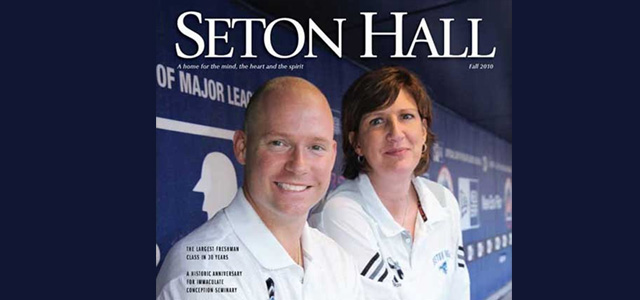Basketball star Anne Donovan returns to her New Jersey roots to coach at Seton Hall.
Basketball legend Anne Donovan is a Hall of Famer, winner of two Olympic gold medals, a successful WNBA coach for 14 seasons, and Seton Hall‘s new women‘s coach.
But 35 years ago — as a freshman at nearby Paramus Catholic High School — she was simply raw potential. Already 6 feet 2 inches tall, Donovan wasn‘t so sure she wanted to become the third Donovan sister to be a sports star at the school. “I was very introverted,” she recalls, “really shy and awkward.”
Her coach back then couldn‘t agree more. “We used to kid her that she couldn‘t chew gum and run at the same time,” Rose Battaglia says with a laugh. “But the thing I noticed about her right off is that she never gave up.” And then one day, the young girl gave a preview of her dazzling athletic prowess.
An opponent had stolen the ball and was streaking for an easy layup. “All of a sudden, sort of out of the woodwork, came this lanky kid, all arms and legs, who caught up to the girl in a way that just didn’t seem physically possible, and stopped her from scoring.”
Donovan quickly displayed a very competitive spirit, Battaglia says. “Moreover, she had a great presence. Her parents had taught her this: always stand up tall; don‘t slouch.”
Today, 6 feet, 8 inches tall, Donovan credits Battaglia with helping her grow to her full stature, both emotionally and professionally. The coach taught her the game‘s fundamentals from the ground up, rather than just dumping a big kid into the key to block shots and make layups.
“In a way,” Donovan muses, “she drew me out of myself and into a game that became my whole way of life.”
So perhaps it‘s time for Donovan — who returns to New Jersey thanks to Battaglia’s introductions to Seton Hall — to pass along similar life lessons. “I‘ve always loved to teach the game, and I wanted to go back to college to instruct young women at this age level,” she says.
“At the pro level,” says Donovan, who most recently coached the New York Liberty, “their egos are in check, unlike the men. They‘re still teachable. But it‘s a whole different time in their development than when you get them in college. College kids are almost like clay.
“There‘s a maturation process that has to happen in those four years that‘s critical to a young woman‘s development. It‘s a point when you become who you are. I wanted to be part of that again … especially with what I know now.
“It‘s much more than just teaching basketball,” she says.
“It‘s not about winning, honors and accolades. Rather, it‘s about life choices and who they‘re developing into as young women. It‘s very humbling to be part of that.”
Great Expectations
Donovan says her style has changed a lot since she last coached college players — from 1989 to 1997 — at Old Dominion University (where she had been the first Naismith College Player of the Year) and East Carolina University. “I was a tough nut back then.”
One of Donovan‘s protégés, Shay Hayes, remembers her coach‘s standards well. Now in her first season as an assistant coach for the ECU team, Hayes was a standout under Donovan during three seasons. Her first impression: “She‘s tall. But I looked up to her in two ways, with tremendous respect for her record and, of course, because of her height.”
Hayes‘ second impression: “She‘s tough. She demands a lot of you. She wants to get the best out of you and that‘s what‘s she expects.”
Another ECU star, Danielle Blackman, believes this uncompromising trait is what makes winners. “A lot of people wouldn‘t think it would be such a simple thing,” Blackman says, “but when you put high expectations on players it brings out the best in them.”
One reason this work ethic resonated with Blackman was because of her own determination as a player who stands just 5 feet, 2 inches tall. “Imagine how much I had to go through to play on the college level,” she says. “High expectations? I just loved that. That‘s how I learned to play and to excel. Those are the things I grew up knowing.”
Blackman became Donovan‘s assistant coach at ECU in the 1990s and is now a lifelong friend. But her old coach continues to offer guidance. Blackman remembers a successful team she coached a few years ago that was 30 and 1, and in the midst of a state playoff run. “I called her up and said,
‘I need a couple of new out-of-bounds plays.’ ” They worked perfectly.
Battaglia recalls a successful series of plays that reveal another aspect of Donovan‘s character.
During a scrimmage, Battaglia had called a full-court press — positioning Donovan to flummox an opponent trying to put the ball in play. “That poor young lady had to call at least 10 timeouts,” Battaglia remembers, “because Donovan blocked every attempt.”
Finally, Donovan came over and said, “ ‘Coach, can we take the press off?‘ ”
‘Why?’ Battaglia wanted to know, ‘it‘s working perfectly.’ Responded Donovan: ‘You‘re not looking into her eyes. I am.’
“What that revealed,” Battaglia says, “is that she is a competitor, yet she has a kind heart.”
Donovan is both a teacher and a player‘s coach, Battaglia says, noting that Donovan has always sought to improve. “What she didn‘t know she wanted to learn.” As to her future at Seton Hall, Battaglia says, “She‘ll do fine. And I‘ll be there at every home game.”
Bob Gilbert is a freelance writer in Connecticut.







